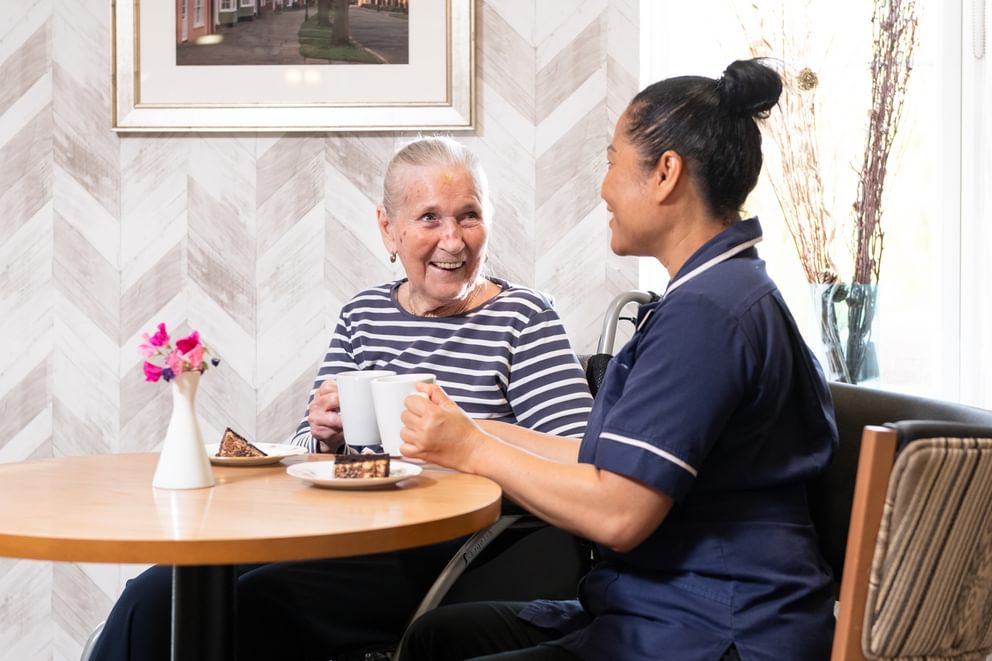What Is The Difference Between Nursing Care And Residential Care?
Considering your options when it’s time for yourself or a loved one to move into a care home can be overwhelming. It may feel like there are many different aspects to consider, including which kind of home is best for them.
You may be researching at this time and wondering what the difference is between nursing care and residential care, or between care homes and nursing homes, and whether nursing care is the best choice for your loved one.
In this blog we’ll explore what the difference is between nursing care and residential care and how this affects the type of care provided to those who are living or staying in a care home, and how to know which is the right kind of care for you or your loved one.
What Is Nursing Care?
There are many different types of care available in various care homes across the country. Nursing care is just one example, and has a few specific features that separate it from other types such as residential, dementia, or palliative care.
Nursing care includes round-the-clock medical care for those in a care setting and is given to those who require extra help from professionals for various conditions. It includes 24/7 access to qualified Registered Nurses who are trained to assist with a wide range of conditions such as stoma care, stroke care, Parkinson’s or Huntington’s disease to name a few.
What Is The Difference Between Residential Care And Nursing Care?
So what is the difference between residential care with or without nursing? Residential care, in general, refers to when someone lives full-time in a care home. Residential care, while available without any additional types of care, can also encompass more specific types of care such as dementia care, nursing care, palliative care, or convalescent care.
So, if nursing care is a subset of residential care, what does nursing care have that standard residential care doesn’t? Well, there a few additional facets of nursing care that make it specialist:
3. Registered General Nurses
One of the key features of nursing care is that Registered General Nurses with specialist training are on hand to help nursing care residents 24/7. The training they receive is in addition to the medical training that other care home staff receive and is more tailored to complex needs.
At Caring Homes, our fully trained nurses are a permanent part of the team, meaning they are able to grow strong relationships with our residents and get to know them and their needs on a personal level.
2. Round-the-clock care
As mentioned, our team of Registered General Nurses are available for assistance 24/7 at our UK nursing homes. This means that if your loved one needs extra care and attention, there is always a trained medical professional on hand.
Having constant access to expert carers also means that, even if a resident becomes poorly, there is less chance of needing to be hospitalised, which we understand can be a difficult and stressful experience.
3. Care for complex health needs
With additional expert medical care on hand comes a knowledge of complex health conditions and how to best manage and alleviate symptoms. Some of the more complex health conditions that our nursing care residents may have include:
- Strokes
- Stomas
- Cancer
- Neurological conditions such as Parkinson’s or Huntington’s disease
- Brain or spinal injuries
- Muscular dystrophy
- Motor Neurone Disease (MND)
- …and more
4. Costs and fees
Other than the level of medical care provided, one of the differences between residential care and nursing care are the costs. Costs for nursing care may be higher than that of regular residential care due to the additional needs of the residents and the additional services provided.
Find out more about the pricing of care and nursing homes and how to fund care for your loved one.
How To Know Which Type of Care Is Best?
If you’re beginning to consider care homes for your loved one, the first place to start is with a care needs assessment from your local council. This will consider many aspects of everyday life for your loved one and any medical needs they have. From this care needs assessment, you should be advised on the best type of care for them, whether residential care, nursing care, dementia care, etc.
Nursing care generally is better suited to those with more complex health needs that cannot be managed suitably at home or by other care home staff.
If you’re looking for high quality care homes for your loved ones to ensure they are being cared for and given the independence and quality of life they deserve, then take a look at our UK care homes. We provide expert nursing care at many of our UK care homes, so why not book a visit and speak to one of the team? Get in touch on 0808 169 8661 or send us a message.

